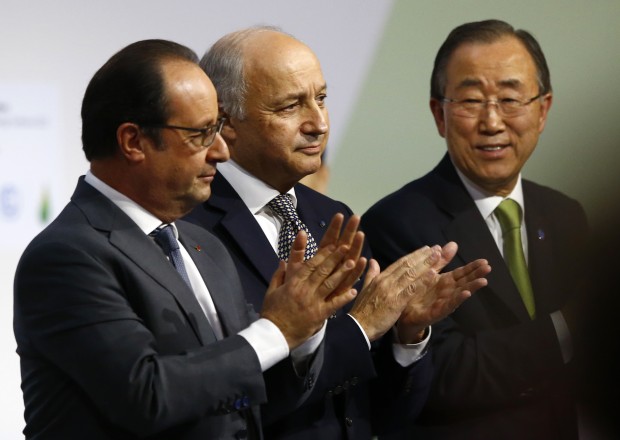Nearly 200 nations near a deal to slow global warming

French President Francois Hollande, left, French foreign minister Laurent Fabius, center, and United Nations Secretary General Ban Ki-moon applaud at the COP21, the United Nations Climate Change Conference, in Le Bourget, north of Paris, Saturday, Dec.12, 2015. Fabius says a “final” draft of a global climate pact would be legally binding. AP
LE BOURGET, France— France presented negotiators from nearly 200 nations with what it called a “final draft” of an unprecedented climate deal to slow global warming and urged them to approve it on Saturday. The deal would slow rising temperatures and sea levels, and eventually hold man-made emissions to the levels that nature can absorb.
If the pact known as “the Paris agreement” is approved, countries would be committed to keeping the rise in global temperatures by the year 2100 compared with pre-industrial times “well below” 2 degrees Celsius (3.6 degrees Fahrenheit) and “endeavor to limit” them even more, to 1.5 degrees Celsius. That was a key demand of poor countries ravaged by the effects of climate change and rising sea levels.
They would also be committed to limiting the amount of greenhouse gases emitted by human activity to the same levels that trees, soil and oceans can absorb naturally, beginning at some point between 2050 and 2100.
Negotiators had a few hours to analyze the draft before going into a plenary meeting for possible adoption. French President Francois Hollande, who joined the meeting Saturday to add weight to the negotiations, urged them to approve it.
“The decisive agreement for the planet is here and now,” Hollande said. “France calls upon you to adopt the first universal agreement on climate.”
Article continues after this advertisementThe deal, meant to take effect in 2020, would be the first to ask all countries to join the fight against global warming, representing a sea change in the U.N. talks, which previously required only wealthy nations to reduce their emissions.
Article continues after this advertisement“This is a good text,” said Brazilian Environment Minister Izabella Teixeira. “Brazil can accept this.”
Some delegates, however, noted that the long-term temperature goals would not be achieved by the emissions targets more than 180 countries have set for themselves so far.
“We’ve agreed to what we ought to be doing, but no one yet has agreed to go do it,” said Dennis Clare, a negotiator for the Federated States of Micronesia. “It’s a whole lot of pomp, given the circumstances.”
The new version removes disputed concepts like “climate neutrality” or “emissions neutrality” which had appeared in earlier drafts but met opposition from countries including China. It sets a goal of getting global greenhouse gas emissions to start falling “as soon as possible”; they have been generally rising since the industrial revolution.
It says wealthy nations should continue to provide financial support for poor nations to cope with climate change and “encouraged” other countries to pitch in on a voluntary basis. That reflects Western attempts to expand the donor base to include advanced developing countries such as China.
In what would be a victory for small island nations, the draft includes a section highlighting the losses they expect to incur from climate-related disasters that it’s too late to adapt to. However, a footnote specifies that it “does not involve or provide any basis for any liability or compensation” — a key U.S. demand because it would let the Obama administration sign on to the deal without going through the Republican-led Senate.
Activists who say the agreement won’t go far enough held protests across Paris on Saturday, calling attention to populations threatened by melting glaciers, rising seas and expanding deserts.
“This puts the fossil fuel industry on the wrong side of history,” said Kumi Naidoo of Greenpeace. “This deal alone won’t dig us out of the hole we’re in.”
The world has already warmed by about 1 degree Celsius since pre-industrial times, and poor low-lying nations have pushed to set a goal of limiting the rise to another half-degree on top of that.
Ben Strauss, a sea level researcher at Climate Central, said limiting warming to 1.5 degrees instead of 2 degrees could potentially cut in half the projected 280 million people whose houses will eventually be submerged by rising seas.
Still, if the more than 190 nations gathered in Paris agree to the accord, it would be a breakthrough. The U.N. has been working for more than two decades to persuade governments to work together to reduce the man-made emissions that scientists say are warming the planet.
The previous emissions treaty, the 1997 Kyoto Protocol, included only rich countries and the U.S. never signed on. The last climate summit, in Copenhagen in 2009, ended in failure when countries couldn’t agree on a binding emissions pact.
U.N. Secretary General Ban Ki Moon urged delegates to adopt the draft.
“We must protect the planet that sustains us,” Ban told the negotiators, adding: “The whole world is watching. Billions of people are relying on your wisdom.”
The talks were initially scheduled to end Friday. U.N. climate conferences often run over time, because of the high stakes and widely differing demands and economic concerns of countries as diverse as the United States and tiny Pacific island nations.
More than 180 countries presented plans to cut or curb greenhouse gas emissions in the run-up to the conference. That in itself was a major breakthrough for the climate talks, showing almost all countries were ready to be part of the new deal after years of stalemate.
But disputes arose in Paris over how to anchor those targets in a binding international pact, with China and other major developing countries insisting on different rules for rich and poor nations.
The draft strikes a middle ground, removing a strict firewall between rich and poor nations and saying that expectations on countries to take climate action should grow as their capabilities evolve.